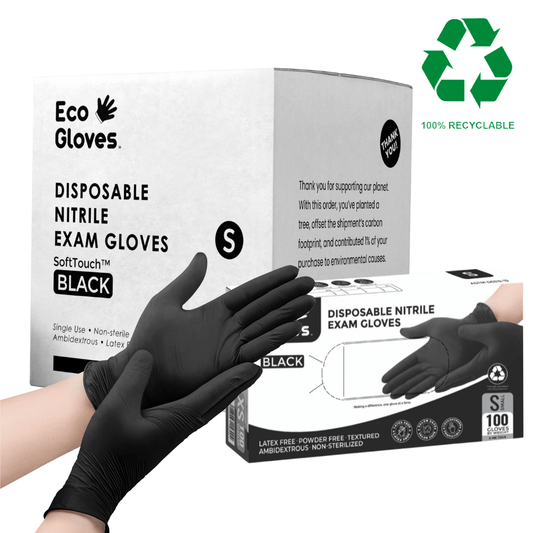The Role of Sustainable Gloves in the Cannabis Manufacturing Industry
Eco Gloves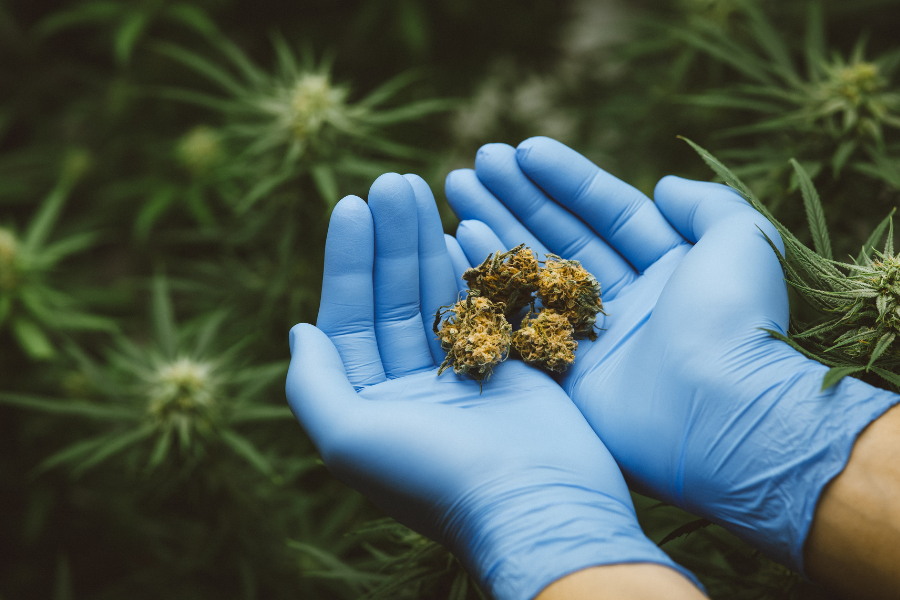
In the rapidly evolving landscape of the cannabis industry, sustainability has emerged as a key pillar guiding businesses towards ethical and environmentally responsible practices. One often-overlooked aspect of this journey is the use of gloves in the manufacturing process. This article delves into the significance of sustainable gloves, particularly compostable and biodegradable nitrile gloves, in the cannabis manufacturing industry. It also explores how incorporating sustainable gloves aligns with the industry's mission and supports Environmental, Social, and Governance (ESG) principles.
Topics Covered
- Understanding the Need for Sustainable Gloves
- Benefits of Sustainable Gloves in Cannabis Manufacturing
- The Lifecycle of a Disposable Glove
- Aligning with the Mission of the Cannabis Industry
- Key Takeaways: Sustainable Gloves in the Cannabis Manufacturing Industry
- Frequently Asked Questions
Understanding the Need for Sustainable Gloves

Traditional gloves used in manufacturing, including those in the cannabis industry, often contribute to environmental degradation. Many factors related to the production, disposal, and material use of traditional gloves pose a significant threat to ecosystems. In this section we will further explore the environmental impact of conventional gloves and why it is so important to look towards sustainable alternatives:
Production and Material Use
Resource-Intensive Materials
The production of disposable gloves, commonly made from latex, nitrile, or vinyl, relies heavily on resource-intensive materials. Notably, both nitrile and vinyl gloves are derived from petroleum products, leading to a substantial environmental impact. The extraction and processing of these materials contribute significantly to habitat destruction, water pollution, and greenhouse gas emissions. Even latex gloves, although derived from natural rubber sap, often involve deforestation and biodiversity loss due to the expansion of rubber plantations.
Environmental Degradation
The production of latex, nitrile, and vinyl gloves is closely linked to environmental degradation. The extraction of petroleum products for nitrile and vinyl gloves results in habitat destruction and water pollution, while the expansion of rubber plantations for latex gloves contributes to deforestation and biodiversity loss. Understanding the environmental consequences of material production is crucial in evaluating the overall sustainability of disposable gloves.
Energy Consumption and Emissions
Energy-Intensive Manufacturing
The manufacturing process of disposable gloves is inherently energy-intensive, adding to their environmental footprint. The use of fossil fuels, a non-renewable resource, in both the production and transportation of these gloves exacerbates their carbon footprint, contributing to climate change. The energy requirements for manufacturing, particularly in the case of nitrile and vinyl gloves, highlight the need for more sustainable alternatives to reduce the industry's reliance on non-renewable resources.
Chemical Processes and Air Quality Concerns
Chemical processes involved in manufacturing, especially for nitrile and vinyl gloves, release volatile organic compounds (VOCs) and other pollutants. These emissions can harm air quality and pose risks to human health. Recognizing the impact of these chemical processes sheds light on the urgency of adopting sustainable practices in glove manufacturing to mitigate the environmental and health consequences associated with conventional disposable gloves.
Waste and Disposal Challenges
Incineration Risks
One form of mass disposal of single use gloves is incineration. While incineration effectively reduces waste volume and addresses biohazard contamination concerns, it releases toxic pollutants such as dioxins and furans. These pollutants pose significant health risks and contribute to air pollution, emphasizing the need for more eco-friendly disposal methods.
Long-Term Environmental Hazards
In landfills, disposable gloves take decades to centuries to decompose, leaching chemicals into the soil and groundwater during this prolonged period. This poses long-term environmental hazards and emphasizes the importance of exploring biodegradable alternatives. The visual impact of glove litter in natural habitats not only mars landscapes but also poses risks to wildlife, which can ingest or become entangled in discarded gloves.
Global Scale and Urgency
The global demand for disposable gloves has witnessed a surge, especially during health crises like the COVID-19 pandemic. This increased usage amplifies the environmental impact, making it a pressing global concern that necessitates immediate attention. The sheer volume of gloves produced, used, and disposed of magnifies the urgency of addressing sustainability issues, calling for concerted efforts toward adopting eco-friendly alternatives on a global scale.
Importance of Sustainable Alternatives
The cannabis industry, with its emphasis on natural products and environmental consciousness, is ideally positioned to lead the adoption of sustainable gloves. Compostable and biodegradable nitrile gloves offer a viable alternative, minimizing environmental harm throughout their lifecycle.
Benefits of Sustainable Gloves in Cannabis Manufacturing
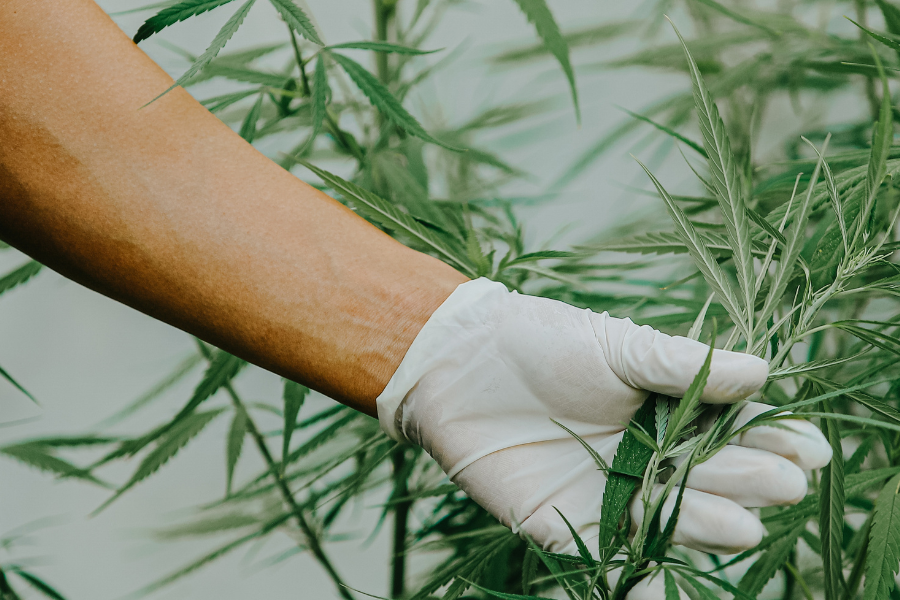
1. Reduced Environmental Footprint
Compostable and biodegradable gloves break down naturally, reducing the accumulation of non-biodegradable waste in landfills. This aligns with the cannabis industry's commitment to environmental stewardship and sustainability.
2. Enhanced Product Quality and Safety
Sustainable gloves, free from harmful chemicals and toxins, help maintain product purity during manufacturing processes. This is crucial in the cannabis industry, where product quality and safety standards are paramount.
3. Positive Brand Image and Consumer Perception
Embracing sustainable practices, including the use of eco-friendly gloves, enhances a company's reputation as a responsible and environmentally conscious brand. Consumers in the cannabis market increasingly value businesses that prioritize sustainability.
The Lifecycle of a Disposable Glove
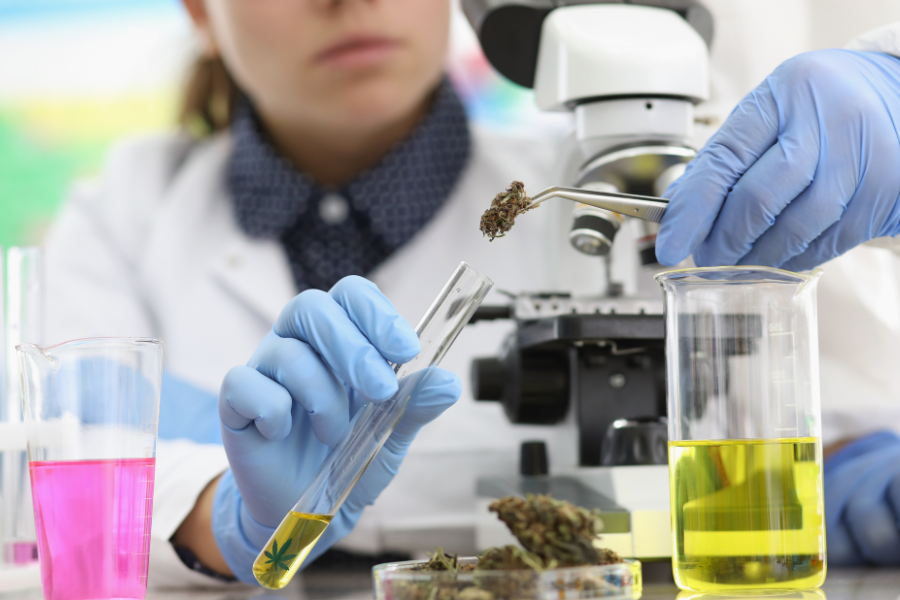
-
Cultivation and Harvesting
During cultivation and harvesting, workers come into direct contact with cannabis plants. Using compostable gloves ensures that no harmful residues from conventional gloves contaminate the plants, thereby upholding organic and natural production standards.
-
Extraction and Processing
In extraction and processing facilities, where precision and hygiene are crucial, sustainable gloves play a vital role in maintaining product integrity. They prevent cross-contamination and uphold the purity of extracted compounds.
-
Packaging and Distribution
Even in the packaging and distribution phases, sustainable gloves contribute to the overall sustainability of the supply chain. By opting for compostable and biodegradable options, companies reduce their environmental footprint and support circular economy principles.
Aligning with the Mission of the Cannabis Industry
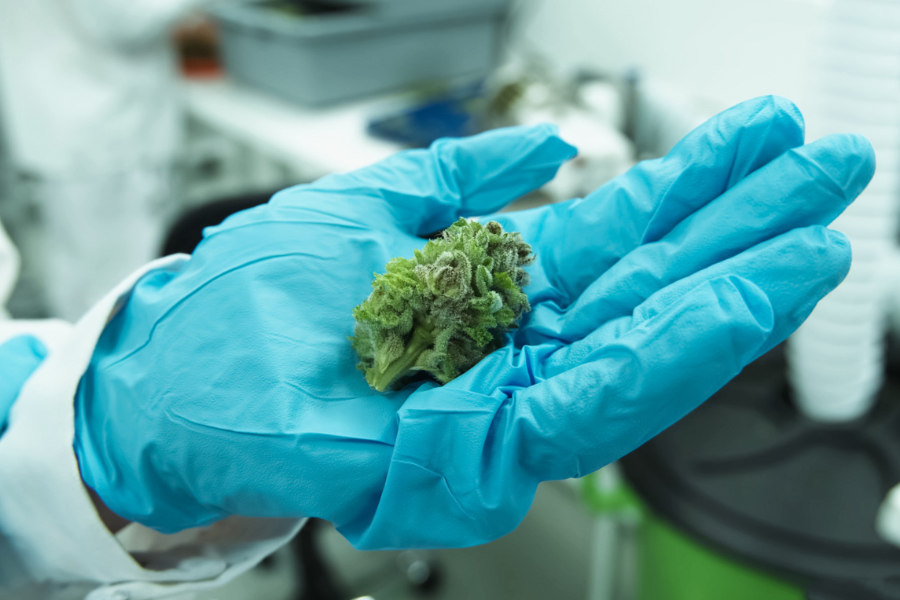
The cannabis industry's overarching mission is to provide consumers with natural, high-quality products while promoting environmental sustainability. Incorporating sustainable gloves into manufacturing processes is a tangible way to fulfill this mission and demonstrate a commitment to ESG principles.
The use of sustainable gloves, particularly compostable and biodegradable options, is integral to advancing environmental sustainability in the cannabis manufacturing industry. By prioritizing eco-friendly alternatives, businesses not only reduce their environmental footprint but also align with the industry's mission of promoting natural products and supporting ESG principles. Eco Gloves stands as a leading provider of sustainable glove solutions, offering options that meet the stringent requirements of the cannabis industry. Moreover, their dedication to carbon offsetting, tree planting initiatives, and contributions to environmental causes further solidify their commitment to sustainability.
Key Takeaways: Sustainable Gloves in the Cannabis Manufacturing Industry
-
Sustainable Gloves Reduce Waste: Compostable and biodegradable nitrile gloves break down naturally, reducing landfill pollution and supporting the cannabis industry’s eco-conscious mission.
-
Comparable Performance: High-quality sustainable gloves match the durability, safety, and protective qualities of conventional gloves.
-
Improved Brand Image: Using eco-friendly gloves reinforces a company’s commitment to ESG principles, appealing to environmentally conscious consumers.
-
Supply Chain Sustainability: From cultivation to packaging, sustainable gloves maintain product integrity while lowering environmental impact.
-
Regulatory Readiness: Early adoption of sustainable gloves helps businesses stay ahead of future environmental regulations.
-
Eco Gloves as a Trusted Partner: Providing compostable and biodegradable gloves that meet the strict safety and performance standards of the cannabis industry.
👉 Choosing sustainable gloves is more than an environmental choice—it’s a strategic move that supports brand values, meets industry standards, and builds long-term customer loyalty.
Frequently Asked Questions
-
Are compostable gloves as durable as conventional gloves in the manufacturing setting?
Yes. High-grade compostable gloves are designed to meet the demands of cannabis manufacturing, providing similar durability and protection as traditional gloves.
-
How do sustainable gloves contribute to the overall sustainability of the cannabis supply chain?
They reduce single-use glove waste, minimize environmental harm, and support a more eco-friendly and circular cannabis supply chain.
-
Can sustainable gloves be used interchangeably with conventional gloves in manufacturing?
Yes. Compostable and biodegradable gloves can be direct substitutes for conventional gloves, even if only partially integrated into operations.
-
What measures can cannabis manufacturers take to ensure the responsible disposal of sustainable gloves?
Use gloves that can decompose within 1–3 years, implement recycling programs, or partner with waste management companies for eco-friendly disposal solutions.
-
How does the use of sustainable gloves contribute to consumer trust and loyalty in the cannabis industry?
Sustainability resonates with consumers. By using eco-friendly gloves, brands show commitment to environmental responsibility, building trust and loyalty among eco-conscious buyers.









